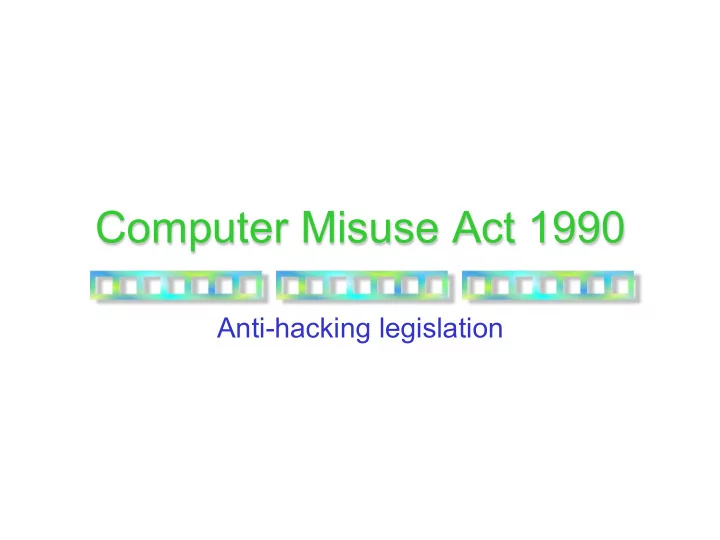

Computer Misuse Act 1990 Anti-hacking legislation
Background • No laws specifically to deal with computer crime prior to 1990 • Other laws tried instead • Examples. • Cox v Riley 1986 (Criminal Damage Act 1971) • R. v Whitely 1990 (Criminal Damage Act 1971) • R. v Gold and Another (Forgery and Counterfeiting Act 1981) 2/14
Background 2 • The case of R. v Gold and Another was highly publicised • Defendant released on appeal • Lead to Law Commission produced report • Report No.186, Computer Misuse • Michael Colvin’s (MP) Private Member’s Bill • This became the Computer Misuse Act 1990 3/14
Problems • Original bill specifically aimed at hackers • Many amendments during passage through parliament • Eventual legislation very broad based, lost much of the original intent 4/14
Offences • The Act specifies 3 offences • In summary these are:- – Unauthorised Access – Unauthorised access with intent to commit another offence – Unauthorised modification of data 5/14
Penalties 1 • Unauthorised Access is called a summary offence and penalties are limited to – 6 months imprisonment and/or – a maximum fine of £5000 6/14
Penalties 2 • The other two offences – Unauthorised access with intent … – Unauthorised modification … • Are more serious and carry jail terms of up to 5 years and unlimited fines 7/14
Examples 1 Scenario 1 • A student hacks into a college database to impress his friends - unauthorised access • Later he decide to go in again, to alter his grades, but cannot find the correct file - unauthorised access with intent... • A week later he succeeds and alters his grades - unauthorised modification of data 8/14
Examples 2 Scenario 2 • An employee who is about to made redundant finds the Managing Director’s password; logs into the computer system using this and looks at some confidential files- unauthorised access • Having received his redundancy notice he goes back in to try and cause some damage but fails to do so - unauthorised access with intent... • After asking a friend, he finds out how to delete files and wipes the main customer database - unauthorised modification 9/14
Problems • While there has been a rise in hacking • more computers/Internet gives greater access • Prosecution are rare and punishments small – Examples • Defendant causes firm to lose £36,000 - Fined £1,650; conditional discharge • Defendant destroys £30,000 worth of data - Fined £3000; 140 hours community service 10/14
Reasons • Very complex • Offences difficult to prove • Evidence difficult to collect - firms do not co-operate with police • Firms embarrassed by hacking - particularly banks • Employees often simply sacked/demoted • Police lack expertise; time; money • Offence perceived as ‘soft crime’ no one injured/hurt 11/14
The Bedworth case • This case in 1991 caused great concern and it was suggested that further prosecutions under the act would be unlikely to succeed – Defendant (and others) hacked into a variety of systems and caused damage – Defence stated that defendant ‘addicted to computers’ so could not help hacking – Not guilty verdict returned by jury 12/14
Current situation • Hacking has increased both at hobby and professional levels • A few high profile cases • Offenders often in other countries with no equivalent legislation • Some ‘international task forces’ set up but no real progress • Current estimated costs of hacking - £5 billion per year world-wide 13/14
The End
Recommend
More recommend